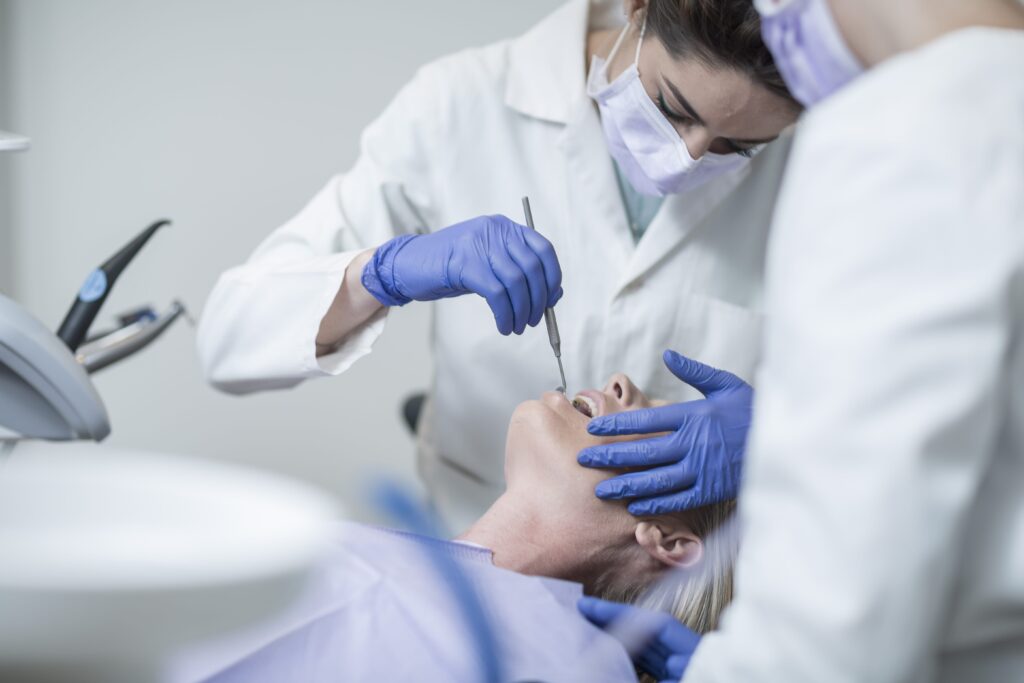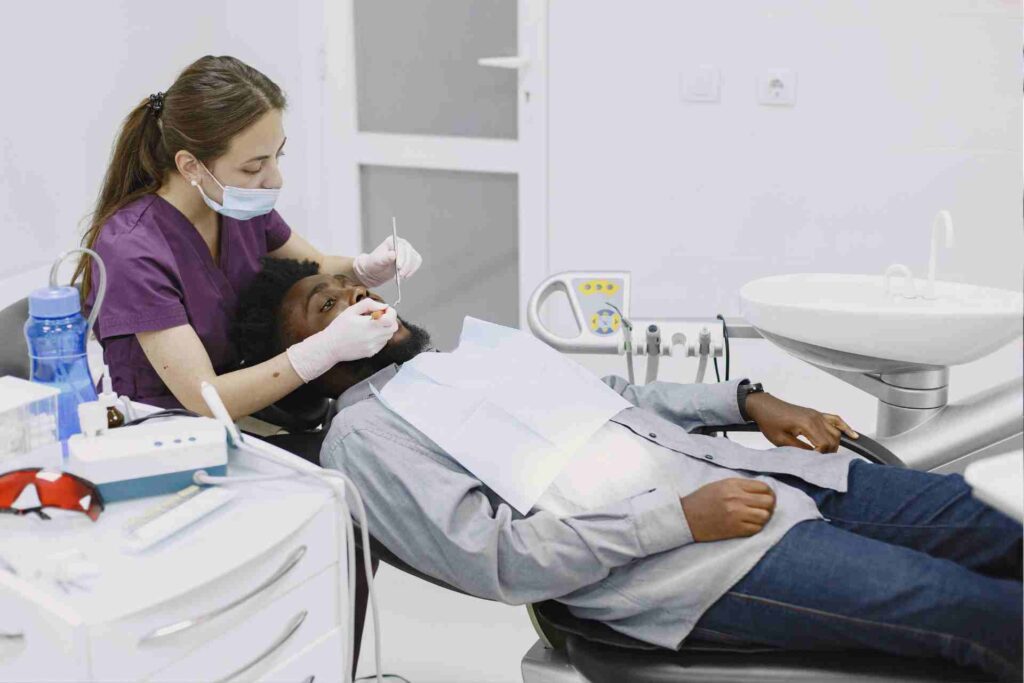Highlights
- Gum healing time varies, from 1–2 weeks for minor irritations to several months for major procedures.
- Common reasons for gum healing include extractions, deep cleaning, surgery, gingivitis, and everyday cuts.
- Factors like oral hygiene, smoking, age, and overall health affect how fast gums recover.
- At-home care (gentle brushing, saltwater rinses, healthy diet) helps speed healing.
- See a dentist if healing takes longer than 2 weeks or if you notice signs of infection.
Gums usually take about 1 to 2 weeks to heal from minor irritation, like a small cut or sensitivity from brushing too hard. However, healing can take longer, anywhere from a few weeks to several months, depending on the cause and severity. While it’s completely normal for healing times to vary, understanding what affects recovery can help you get back to feeling better faster.
Healing is a natural part of your gums’ process, but there are factors that can speed up or slow down recovery. Knowing what impacts gum healing, and what you can do to care for your gums during this time is key. Let’s explore some common influences and helpful tips to support faster healing.
Common Reasons Your Gums Need Healing

Below, we’ll explore common reasons your gums may need healing and how to care for them effectively.
After Dental Procedures
Certain dental treatments can leave your gums feeling tender or sensitive as they recover. These include:
- Scaling and root planing (deep cleaning): This procedure removes plaque and tartar buildup beneath the gumline, which can cause temporary sensitivity as the gums heal.
- Tooth extraction: After a tooth is removed, the surrounding gum tissue needs time to repair and close fully.
- Gum surgery or flap surgery: These treatments for advanced gum disease involve cutting and lifting gum tissue, often requiring dedicated aftercare to promote healing.
Related Reading: Gum Flap
Everyday Gum Issues
Even in your daily life, your gums can sometimes face challenges that require attention. Common culprits include:
- Gingivitis or gum inflammation: The earliest stage of gum disease is often caused by plaque buildup and can result in redness, swelling, or bleeding.
- Cuts from food or trauma: Sharp foods like chips or accidental injuries from brushing too hard can leave small cuts or abrasions on your gums.
- Canker sores or ulcers: These small, painful sores that appear on the gums or inside your mouth can make eating and brushing uncomfortable while they heal.
Related Reading: Canker Sores During Pregnancy
Taking the time to identify the cause of your gum issues and following proper care advice can help your mouth heal more quickly and comfortably.
How Long Do Gums Take to Heal? (By Situation)

The time it takes for gums to heal depends on the situation. While minor cuts might heal quickly, more advanced procedures like gum surgery or deep cleaning require longer recovery times. Here’s what you need to know:
Minor Cuts or Irritation
Gums typically heal within 1–2 weeks. Regular brushing and flossing with care can help speed up recovery.
After Tooth Extraction
Gum tissue usually heals in 1–2 weeks, but complete jawbone healing may take several months. Following aftercare instructions is essential to avoid complications like dry socket.
Deep Cleaning (Scaling/Root Planing)
Recovery lasts around 1–2 weeks, depending on the severity of gum disease. You might notice less inflammation and sensitivity as your gums recover.
Gum Surgery
Initial healing takes 2–4 weeks, while full recovery can extend to 3+ months, especially for more invasive procedures like grafting.
Related Reading: How Gum Disease is Treated
Gingivitis Treatment
Minor cases may show improvement within days if you adopt proper oral hygiene, but full healing can take several weeks.
Factors That Affect Gum Healing Time
Healing after a dental procedure varies for everyone, but several key factors can influence how quickly your gums recover. Understanding these can help guide recovery and ensure proper care post-treatment.
Severity of the Condition or Procedure
The more complex the procedure or the more severe the condition, the longer it may take for your gums to heal. For example, a simple gum cleaning has a vastly different recovery time compared to a more invasive surgery like a gum graft.
Oral Hygiene Habits
Keeping your mouth clean is essential for healing. Good oral hygiene habits, like gentle brushing, flossing, and rinsing with recommended solutions, can prevent infections and promote faster recovery.
Lifestyle Factors
Certain lifestyle choices can slow down the healing process. Smoking and heavy alcohol use are known to impair gum health and delay recovery, making it vital to avoid these during your healing period.
Overall Health
Your general health plays a significant role in healing. Conditions like diabetes or a weakened immune system can hinder your body’s ability to repair itself. Staying on top of your overall wellness can make a big difference.
Age and Healing Ability
Younger individuals often heal quicker due to their body’s ability to regenerate tissues faster. However, as we age, the body’s natural healing processes can slow, meaning extra care and patience may be required.
How to Help Your Gums Heal Faster

By combining simple at-home care practices and professional support, you can promote faster, healthier healing while preventing complications.
At-Home Care Tips
Taking care of your gums at home is key to speeding up the healing process. Here are a few steps to follow:
- Gentle brushing with a soft-bristled toothbrush to avoid further irritation.
- Use warm saltwater rinses to reduce swelling and clean the area naturally.
- Stay hydrated and eat soft, nutritious foods, like yogurt, eggs, or soups, to provide your body with the nutrients it needs to heal.
- Avoid smoking and alcohol, as these can delay healing and irritate your gums further.
Professional Support
Sometimes healing requires a little extra help from your dental professional. Here’s what to consider:
- Follow-up cleanings to ensure your gums stay free of bacteria and debris.
- Prescription rinses or medications your dentist may recommend to promote healing and prevent infection.
- When to call your dentist: If your gums show no improvement after a few days or if you notice increased pain, swelling, or signs of infection, it’s time to reach out for further guidance.
When to See a Dentist About Slow Gum Healing

Here are some signs you should see a dentist sooner rather than later:
- Persistent pain or swelling that lasts beyond two weeks.
- The presence of pus, bleeding, or a bad odor, which could indicate an infection.
- Loose teeth or receding gums that make chewing or brushing uncomfortable.
- Any signs of infection or worsening gum disease, such as increased redness, tenderness, or discharge.
These symptoms can point to underlying dental issues that may need professional care. While it’s possible for minor gum irritation to improve on its own, having symptoms that linger or worsen often requires treatment from your dentist to avoid further complications. It’s always better to play it safe with your oral health!
Frequently Asked Questions
How long does it take for gums to heal after a deep cleaning?
Most patients notice healing within 1–2 weeks, but tender spots may last a little longer depending on the severity of gum disease.
Do gums heal faster if I use saltwater rinses?
Yes, rinsing gently with warm saltwater can help reduce bacteria and swelling, which supports faster healing.
How long should gums bleed after dental work?
Mild bleeding can happen for a day or two, but if it continues or worsens after that, you should call your dentist.
Can gums grow back after they recede?
Unfortunately, receded gums don’t grow back on their own, but treatments like gum grafts or deep cleanings can restore protection and improve your smile.
What slows down gum healing?
Smoking, poor oral hygiene, certain health conditions (like diabetes), and skipping follow-up care can all delay healing.
How do I know if my gums are infected after surgery or extraction?
Look out for persistent swelling, pus, severe pain, or a bad odor. These are signs you should contact your dentist right away.
Should I avoid certain foods while my gums are healing?
Yes. Stick to soft, cool, and non-spicy foods for the first few days. Avoid crunchy snacks, alcohol, or anything that could irritate your gums.
Gums Aren’t Healing The Way They Should? Don’t Wait!
Healing times vary, but with proper care and professional support, most gum issues resolve smoothly. It’s important to remember that every recovery process is unique, and prompt attention often leads to the best outcomes.
A quick visit can give you peace of mind and the right care plan to get back to a healthy smile.
- Book your appointment online
- Follow me on Instagram for everyday dental health tips and insights
Taking proactive steps for your gum health now can make all the difference in ensuring your smile stays strong and vibrant.





















